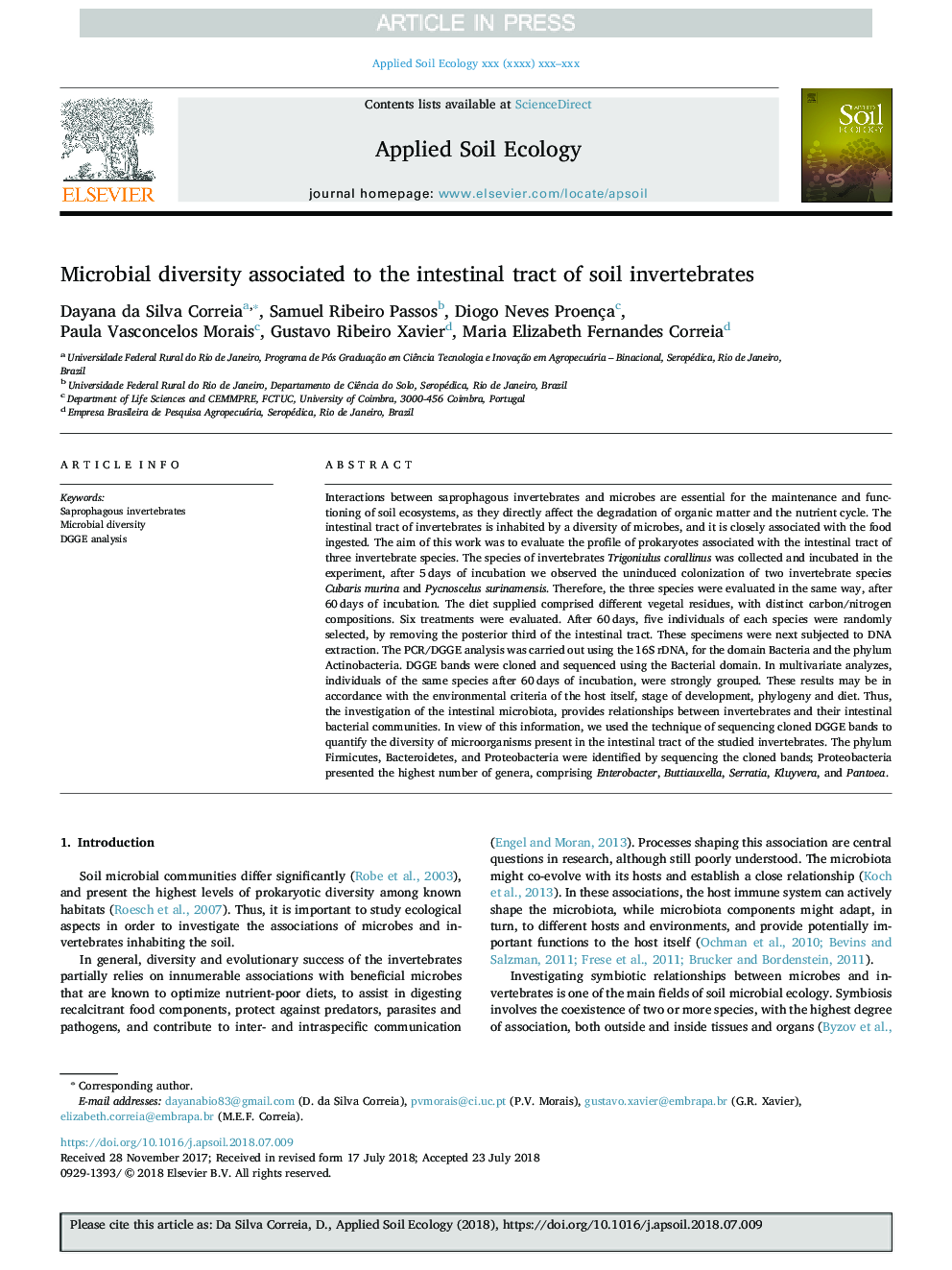| کد مقاله | کد نشریه | سال انتشار | مقاله انگلیسی | نسخه تمام متن |
|---|---|---|---|---|
| 10223322 | 1701022 | 2018 | 9 صفحه PDF | دانلود رایگان |
عنوان انگلیسی مقاله ISI
Microbial diversity associated to the intestinal tract of soil invertebrates
ترجمه فارسی عنوان
تنوع میکروبی مرتبط با دستگاه گوارش بی مهرگان خاکی
دانلود مقاله + سفارش ترجمه
دانلود مقاله ISI انگلیسی
رایگان برای ایرانیان
کلمات کلیدی
موضوعات مرتبط
علوم زیستی و بیوفناوری
علوم کشاورزی و بیولوژیک
بوم شناسی، تکامل، رفتار و سامانه شناسی
چکیده انگلیسی
Interactions between saprophagous invertebrates and microbes are essential for the maintenance and functioning of soil ecosystems, as they directly affect the degradation of organic matter and the nutrient cycle. The intestinal tract of invertebrates is inhabited by a diversity of microbes, and it is closely associated with the food ingested. The aim of this work was to evaluate the profile of prokaryotes associated with the intestinal tract of three invertebrate species. The species of invertebrates Trigoniulus corallinus was collected and incubated in the experiment, after 5â¯days of incubation we observed the uninduced colonization of two invertebrate species Cubaris murina and Pycnoscelus surinamensis. Therefore, the three species were evaluated in the same way, after 60â¯days of incubation. The diet supplied comprised different vegetal residues, with distinct carbon/nitrogen compositions. Six treatments were evaluated. After 60â¯days, five individuals of each species were randomly selected, by removing the posterior third of the intestinal tract. These specimens were next subjected to DNA extraction. The PCR/DGGE analysis was carried out using the 16S rDNA, for the domain Bacteria and the phylum Actinobacteria. DGGE bands were cloned and sequenced using the Bacterial domain. In multivariate analyzes, individuals of the same species after 60â¯days of incubation, were strongly grouped. These results may be in accordance with the environmental criteria of the host itself, stage of development, phylogeny and diet. Thus, the investigation of the intestinal microbiota, provides relationships between invertebrates and their intestinal bacterial communities. In view of this information, we used the technique of sequencing cloned DGGE bands to quantify the diversity of microorganisms present in the intestinal tract of the studied invertebrates. The phylum Firmicutes, Bacteroidetes, and Proteobacteria were identified by sequencing the cloned bands; Proteobacteria presented the highest number of genera, comprising Enterobacter, Buttiauxella, Serratia, Kluyvera, and Pantoea.
ناشر
Database: Elsevier - ScienceDirect (ساینس دایرکت)
Journal: Applied Soil Ecology - Volume 131, October 2018, Pages 38-46
Journal: Applied Soil Ecology - Volume 131, October 2018, Pages 38-46
نویسندگان
Dayana da Silva Correia, Samuel Ribeiro Passos, Diogo Neves Proença, Paula Vasconcelos Morais, Gustavo Ribeiro Xavier, Maria Elizabeth Fernandes Correia,
